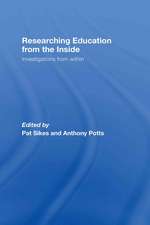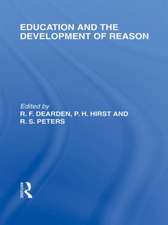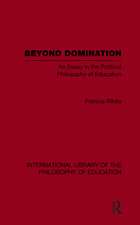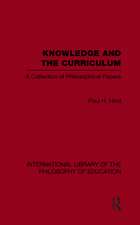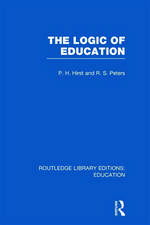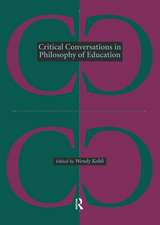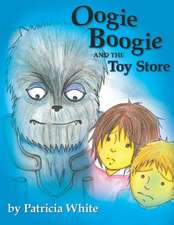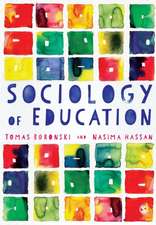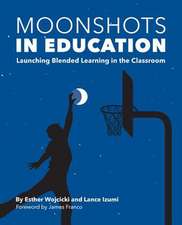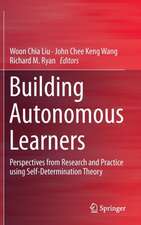Philosophy of Education: Major Themes in the Analytic Tradition: Major Themes in Education
Editat de Paul Hirst, Patricia Whiteen Limba Engleză Hardback – 2 iul 1998
The work collected here represents the major ideas and arguments which have come to characterise philosophy of education. This comprehensive set includes work from the perspectives of Marxism, phenomenology, feminist theory, critical theory and others. The individual volumes cover:
* philosophy and education
* education and human being
* society and education
* problems of educational content and practice.
The featured articles map the most important writings within the analytic and intersecting traditions, and the set presents an influential and essential body of work for researchers in the philosophy of education, the field of educational studies and educationally-oriented policy studies.
Din seria Major Themes in Education
-
 Preț: 6595.43 lei
Preț: 6595.43 lei - 18%
 Preț: 6612.83 lei
Preț: 6612.83 lei - 34%
 Preț: 2111.19 lei
Preț: 2111.19 lei - 34%
 Preț: 4387.08 lei
Preț: 4387.08 lei - 34%
 Preț: 5240.46 lei
Preț: 5240.46 lei - 34%
 Preț: 4376.48 lei
Preț: 4376.48 lei - 34%
 Preț: 7029.76 lei
Preț: 7029.76 lei - 34%
 Preț: 7038.12 lei
Preț: 7038.12 lei - 34%
 Preț: 4241.85 lei
Preț: 4241.85 lei - 33%
 Preț: 2876.67 lei
Preț: 2876.67 lei - 34%
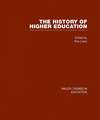 Preț: 7039.74 lei
Preț: 7039.74 lei - 34%
 Preț: 4240.24 lei
Preț: 4240.24 lei - 34%
 Preț: 5352.30 lei
Preț: 5352.30 lei - 34%
 Preț: 4522.13 lei
Preț: 4522.13 lei - 34%
 Preț: 6479.43 lei
Preț: 6479.43 lei - 34%
 Preț: 6180.43 lei
Preț: 6180.43 lei - 34%
 Preț: 6738.77 lei
Preț: 6738.77 lei - 34%
 Preț: 7595.82 lei
Preț: 7595.82 lei - 34%
 Preț: 4385.88 lei
Preț: 4385.88 lei - 34%
 Preț: 6741.21 lei
Preț: 6741.21 lei - 34%
 Preț: 6745.31 lei
Preț: 6745.31 lei - 34%
 Preț: 3631.24 lei
Preț: 3631.24 lei - 34%
 Preț: 7590.91 lei
Preț: 7590.91 lei - 34%
 Preț: 6464.08 lei
Preț: 6464.08 lei - 34%
 Preț: 5354.33 lei
Preț: 5354.33 lei - 34%
 Preț: 3827.51 lei
Preț: 3827.51 lei - 34%
 Preț: 5365.74 lei
Preț: 5365.74 lei - 34%
 Preț: 6188.99 lei
Preț: 6188.99 lei - 34%
 Preț: 7857.85 lei
Preț: 7857.85 lei - 34%
 Preț: 6191.03 lei
Preț: 6191.03 lei - 34%
 Preț: 6698.07 lei
Preț: 6698.07 lei - 34%
 Preț: 6732.66 lei
Preț: 6732.66 lei - 34%
 Preț: 5301.30 lei
Preț: 5301.30 lei - 34%
 Preț: 5579.67 lei
Preț: 5579.67 lei
Preț: 4228.73 lei
Preț vechi: 6392.69 lei
-34% Nou
Puncte Express: 6343
Preț estimativ în valută:
809.13€ • 844.90$ • 668.18£
809.13€ • 844.90$ • 668.18£
Carte tipărită la comandă
Livrare economică 15-29 aprilie
Preluare comenzi: 021 569.72.76
Specificații
ISBN-13: 9780415129442
ISBN-10: 0415129443
Pagini: 1712
Dimensiuni: 156 x 234 mm
Greutate: 2.72 kg
Ediția:1
Editura: Taylor & Francis
Colecția Routledge
Seria Major Themes in Education
Locul publicării:Oxford, United Kingdom
ISBN-10: 0415129443
Pagini: 1712
Dimensiuni: 156 x 234 mm
Greutate: 2.72 kg
Ediția:1
Editura: Taylor & Francis
Colecția Routledge
Seria Major Themes in Education
Locul publicării:Oxford, United Kingdom
Public țintă
PostgraduateCuprins
VOLUME I: PHILOSOPHY AND EDUCATION
PART 1: Philosophy and philosophy of education
1. Paul R. Hurst and R. S. Peters, Education and philosophy
2. Abraham Edel, Analytic philosophy of education at the crossroads
3. Peter Gilroy, The revolutions in English philosophy and philosophy of education
4. R. K. Elliott, Richard Peters: a philosopher in the older style
5. John Haldane, Metaphysics in the philosophy of education
6. Colin V. Evers, Analytic and post-analytic philosophy of education: methodological reflections
PART 2: Educational theory and practice
7. Paul H. Hirst, Educational theory
8. Jim Valker, Philosophy and the study of education: a critique of the common sense consensus
9(i). Vilfred Carr, What is an educational practice?
9(ii). Ruth Jonathan, What is an educational practice? A reply to Wilfred Carr
9(iii). David E. Cooper, Practice, philosophy and history: Carr vs Jonathan
10. Jonas F. Soltis, Perspectives on philosophy of education
PART 3: Conceptions of education
11(i). R.S. Peters, The justification of education
11(ii). R.K. Elliott, Education and justification
12(i). Paul H Hirst, Liberal education and the nature of knowledge
12(ii). Jane Roland Martin, Needed: a new paradigm for liberal education
13. Michael Oakeshott, Education: the engagement and its frustration
14(i). Jane Roland Martin, The ideal of the educated person
14(ii). Harvey Siegel, Genderized cognitive perspectives and the redefinition
of philosophy of education
15. John and Patricia Vhite, Education, liberalism and human good
16. Michael Bonnett, Education in a destitute time
17. Paul H. Hirst, Education, knowledge and practices
VOLUME II: EDUCATION AND HUMAN BEING
Part 1: Education and autonomy
1. R.S. Peters, Freedom and the development of the free man
2. David E. Cooper, Authenticity, life and liberal education
3. Eamonn Callan, Autonomy and alienation
Part 2: Education and the development of mind
4(i). R.K. Elliott, Education and human being
4(ii). Paul H. Hirst, Education and human being: a response to R.K. Elliott
5. R. K. Elliott, Objectivity and education
6(i). D.V. Hamlyn, The concept of development
6(ii). R. K. Elliott, The concept of development: a reply to D.W. Hamlyn
Part 3: Intelligence, emotions, imagination and education
7. John Vhite, Intelligence and the logic of the nature-nurture issue
8(i). R. S. Peters, The education of the emotions
8 (ii). John Vhite, The education of the emotions
8(iii). Mary Varnock, The education of the emotions
9. R.K. Elliott, Versions of creativity
10. John Passmore, Cultivating imagination
Part 4: Needs, interests, happiness and education
11. R. F. Dearden, 'Needs' in education
12. P. S. Vilson, Interests
13. R.F. Dearden, Happiness and education
VOLUME III: SOCIETY AND EDUCATION
Part 1: Democracy, pluralism and education
1. James C. Valker, Education for democracy: the representation/participation dualism
2. Amy Gutmann, Undemocratic education
3. Villiam Galston, Civic education in the liberal state
4. Eamonn Callan, Pluralism and civic education
5. Kenneth A. Strike, On the construction of public speech: pluralism and public reason
6. John Harris, A paradox of multicultural societies
7. Richard Pratte, Cultural diversity and education
8. Malcolm Jones, Education and racism
9. Valter Feinberg, Education, work, and democratic identity
Part 2: Justice, equality and education
10. David E Cooper, Quality and equality in education
11. Kenneth R. Hove, In defense of outcomes-based conceptions of equal educational opportunity
12. Kenneth A. Strike, Fairness and ability grouping
Part 3: Education, schooling and rights
13. Graham Haydon, The right to education and compulsory schooling
14. Joel Feinberg, The child's right to an open future
15. Joseph Diorio, Rights, equality and the ethics of school policy
Part 4: Society and schooling: radical challenges
16. Kevin Harris, Peters on schooling
17. Maryann Ayim and Barbara Houston, A conceptual analysis of sexism and sexist education
18. Colin Vringe, Children into workers
19. Penny Enslin, Education for nation-building: a feminist critique
20. Henry A. Giroux, Marxism and schooling: the limits of radical discourse
21. Landon E. Bayer and Daniel P. Liston, Discourse or moral action? A critique of postmodernism
22. Vilfred Carr, Confronting the postmodernist challenge
23. Terence H. Mclaughlin, Politics, markets and schools: the central issues
Volume IV: PROBLEMS OF EDUCATIONAL CONTENT AND PRACTICES
Part 1: Controversial areas of educational content
(1) Moral education
1. Anthony O’ Hear, Moral education
2. R. S. Peters, Reason and habit: the paradox of moral education
3. Nel Hoddings, Caring
4. Eamonn Callan, Finding a common voice
5. Betty A. Sichel, Character, community and education
6. Patricia Vhite, Friendship and education
(2) Religious education
7(i). Peter Gardner, Religious upbringing and the liberal ideal of religious autonomy
7(ii). Terence H. Mclaughlin, Peter Gardner on religious upbringing and the liberal ideal of religious autonomy
(3) The arts and education
8. Bennett Reimer, What knowledge is of most worth in the arts?
9. R. V. Hepburn, The arts and the education of feeling and emotion
10. John Vhite, The arts, well-being and education
(4) Critical thinking
11(i). Harvey Siegel, McPeck, informal logic and the nature of critical thinking
11(ii). John E. Mcpeck, Response to Harvey Siegel
(5) Gender and education
12. Lyn Yates, Is women's studies a legitimate school subject? An outline of an agenda for discussion
13. Ann Diller and Barbara Houston, Women's physical education: a gender-sensitive perspective
Part 2: Educational practices
14. Israel Schfler, The concept of teaching
15. R.F. Dearden, Instruction and learning by discovery
16. David Bridges, Teaching by discussion
17(i). Ivan Snook, Indoctrination and intentions
17(ii). Henry Rosemount Jr., On the concept of indoctrination
18(i). R. F. Dearden, Competition in education
18(ii). Michael Fielding, Against competition: in praise of a malleable analysis and the subversiveness of philosophy
19. Richard Smith, Punishment, discipline and the moral order
20. Randall R. Curren, Coercion and the ethics of grading and testing
21. Paul Hager, Is there a cogent philosophical argument against competency standards?
Part 3: Controversial issues of curriculum development
22. Robin Barroy, Curriculum design
23. Robin Barroy, Educational psychology and timing in the curriculum
24. Jane Roland Martin, What should we do with a hidden curriculum when we find one?
25. Cleo H. Cherryholmes, Poststructuralism, pragmatism and curriculum
PART 1: Philosophy and philosophy of education
1. Paul R. Hurst and R. S. Peters, Education and philosophy
2. Abraham Edel, Analytic philosophy of education at the crossroads
3. Peter Gilroy, The revolutions in English philosophy and philosophy of education
4. R. K. Elliott, Richard Peters: a philosopher in the older style
5. John Haldane, Metaphysics in the philosophy of education
6. Colin V. Evers, Analytic and post-analytic philosophy of education: methodological reflections
PART 2: Educational theory and practice
7. Paul H. Hirst, Educational theory
8. Jim Valker, Philosophy and the study of education: a critique of the common sense consensus
9(i). Vilfred Carr, What is an educational practice?
9(ii). Ruth Jonathan, What is an educational practice? A reply to Wilfred Carr
9(iii). David E. Cooper, Practice, philosophy and history: Carr vs Jonathan
10. Jonas F. Soltis, Perspectives on philosophy of education
PART 3: Conceptions of education
11(i). R.S. Peters, The justification of education
11(ii). R.K. Elliott, Education and justification
12(i). Paul H Hirst, Liberal education and the nature of knowledge
12(ii). Jane Roland Martin, Needed: a new paradigm for liberal education
13. Michael Oakeshott, Education: the engagement and its frustration
14(i). Jane Roland Martin, The ideal of the educated person
14(ii). Harvey Siegel, Genderized cognitive perspectives and the redefinition
of philosophy of education
15. John and Patricia Vhite, Education, liberalism and human good
16. Michael Bonnett, Education in a destitute time
17. Paul H. Hirst, Education, knowledge and practices
VOLUME II: EDUCATION AND HUMAN BEING
Part 1: Education and autonomy
1. R.S. Peters, Freedom and the development of the free man
2. David E. Cooper, Authenticity, life and liberal education
3. Eamonn Callan, Autonomy and alienation
Part 2: Education and the development of mind
4(i). R.K. Elliott, Education and human being
4(ii). Paul H. Hirst, Education and human being: a response to R.K. Elliott
5. R. K. Elliott, Objectivity and education
6(i). D.V. Hamlyn, The concept of development
6(ii). R. K. Elliott, The concept of development: a reply to D.W. Hamlyn
Part 3: Intelligence, emotions, imagination and education
7. John Vhite, Intelligence and the logic of the nature-nurture issue
8(i). R. S. Peters, The education of the emotions
8 (ii). John Vhite, The education of the emotions
8(iii). Mary Varnock, The education of the emotions
9. R.K. Elliott, Versions of creativity
10. John Passmore, Cultivating imagination
Part 4: Needs, interests, happiness and education
11. R. F. Dearden, 'Needs' in education
12. P. S. Vilson, Interests
13. R.F. Dearden, Happiness and education
VOLUME III: SOCIETY AND EDUCATION
Part 1: Democracy, pluralism and education
1. James C. Valker, Education for democracy: the representation/participation dualism
2. Amy Gutmann, Undemocratic education
3. Villiam Galston, Civic education in the liberal state
4. Eamonn Callan, Pluralism and civic education
5. Kenneth A. Strike, On the construction of public speech: pluralism and public reason
6. John Harris, A paradox of multicultural societies
7. Richard Pratte, Cultural diversity and education
8. Malcolm Jones, Education and racism
9. Valter Feinberg, Education, work, and democratic identity
Part 2: Justice, equality and education
10. David E Cooper, Quality and equality in education
11. Kenneth R. Hove, In defense of outcomes-based conceptions of equal educational opportunity
12. Kenneth A. Strike, Fairness and ability grouping
Part 3: Education, schooling and rights
13. Graham Haydon, The right to education and compulsory schooling
14. Joel Feinberg, The child's right to an open future
15. Joseph Diorio, Rights, equality and the ethics of school policy
Part 4: Society and schooling: radical challenges
16. Kevin Harris, Peters on schooling
17. Maryann Ayim and Barbara Houston, A conceptual analysis of sexism and sexist education
18. Colin Vringe, Children into workers
19. Penny Enslin, Education for nation-building: a feminist critique
20. Henry A. Giroux, Marxism and schooling: the limits of radical discourse
21. Landon E. Bayer and Daniel P. Liston, Discourse or moral action? A critique of postmodernism
22. Vilfred Carr, Confronting the postmodernist challenge
23. Terence H. Mclaughlin, Politics, markets and schools: the central issues
Volume IV: PROBLEMS OF EDUCATIONAL CONTENT AND PRACTICES
Part 1: Controversial areas of educational content
(1) Moral education
1. Anthony O’ Hear, Moral education
2. R. S. Peters, Reason and habit: the paradox of moral education
3. Nel Hoddings, Caring
4. Eamonn Callan, Finding a common voice
5. Betty A. Sichel, Character, community and education
6. Patricia Vhite, Friendship and education
(2) Religious education
7(i). Peter Gardner, Religious upbringing and the liberal ideal of religious autonomy
7(ii). Terence H. Mclaughlin, Peter Gardner on religious upbringing and the liberal ideal of religious autonomy
(3) The arts and education
8. Bennett Reimer, What knowledge is of most worth in the arts?
9. R. V. Hepburn, The arts and the education of feeling and emotion
10. John Vhite, The arts, well-being and education
(4) Critical thinking
11(i). Harvey Siegel, McPeck, informal logic and the nature of critical thinking
11(ii). John E. Mcpeck, Response to Harvey Siegel
(5) Gender and education
12. Lyn Yates, Is women's studies a legitimate school subject? An outline of an agenda for discussion
13. Ann Diller and Barbara Houston, Women's physical education: a gender-sensitive perspective
Part 2: Educational practices
14. Israel Schfler, The concept of teaching
15. R.F. Dearden, Instruction and learning by discovery
16. David Bridges, Teaching by discussion
17(i). Ivan Snook, Indoctrination and intentions
17(ii). Henry Rosemount Jr., On the concept of indoctrination
18(i). R. F. Dearden, Competition in education
18(ii). Michael Fielding, Against competition: in praise of a malleable analysis and the subversiveness of philosophy
19. Richard Smith, Punishment, discipline and the moral order
20. Randall R. Curren, Coercion and the ethics of grading and testing
21. Paul Hager, Is there a cogent philosophical argument against competency standards?
Part 3: Controversial issues of curriculum development
22. Robin Barroy, Curriculum design
23. Robin Barroy, Educational psychology and timing in the curriculum
24. Jane Roland Martin, What should we do with a hidden curriculum when we find one?
25. Cleo H. Cherryholmes, Poststructuralism, pragmatism and curriculum
Recenzii
'...indispensible for libraries...they present a judicious, well-balanced selection of major work in the field which cannot but remain a standard work across the first decades of our new century.' - Bulletin of the UK-Japan Education Forum
Descriere
This comprehensive work represents the major ideas and arguments which have come to characterise the philosophy of education and includes work from the perspectives of Marxism, phenomenology, feminist theory, critical theory and others.



